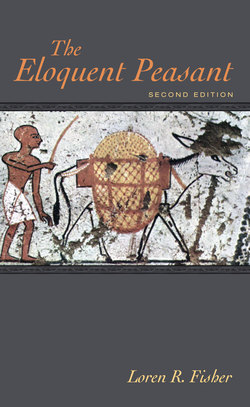Читать книгу The Eloquent Peasant, 2nd edition - Loren R. Fisher - Страница 9
На сайте Литреса книга снята с продажи.
Introduction
ОглавлениеOn February 11, 2011, the Egyptian people experienced freedom and liberation as President Mubarak stepped down after thirty years of dictatorship over Egypt. The Egyptian people discovered that regime change is possible by nonviolence. True, three hundred people were killed and many more wounded by paid Mubarak thugs, but the protesters were willing to die for the freedom of the Egyptian people. This was a joyous event that did something for the people beyond the fulfillment of their demands; they gained a real sense of equality. There were laborers, doctors, lawyers, Muslims, Christians, and secularists. All rose up with one voice saying that Mubarak must go. The world hopes that these people are on the road to democracy, and most of them, for the first time, will experience a life that is defined by freedom from fear, freedom from the old regime, and freedom to fulfill their dreams.
Four thousand years ago a similar great moment occurred in Egypt’s history. It happened toward the end of Egypt’s First Intermediate Period before and during the Eleventh Dynasty (2135 to 2000 BCE). The downfall of the Old Kingdom, which was thought to be eternal, brought an end to material success and introduced anarchy and chaos. The Egyptian people had a difficult time with this change in their lives. The impact of these changes can be observed in A Dialogue between a Man and His Ba,1 which was written in these chaotic times. In this story, the man argues with his Ba (or soul) about suicide.
Some positive works also came from this period. At Heracleopolis one of the kings wrote instructions to his son, Meri-ka-Re, emphasizing the need for reform. Meri-ka-Re’s father taught him to do ma‘at, “truth.” Also the prophet Ipu-wer said that the king should be a good shepherd rather than a wealthy lord. In his book on Egyptian culture, John Wilson writes, “The text which brings out most clearly the new approach to social equality and the new responsibility to render ma‘at to one’s fellows, rather than simply to the gods, is The Story of the Eloquent Peasant.”2 Wilson is correct. Equality and the hope for social justice is the fundamental theme in the story of The Eloquent Peasant, and this is why I have been interested in this story for some time.
The eloquent peasant, whose name is Khun-Anup, has much in common with the Egyptians in Tahrir Square. He was a poor peasant, who while taking his produce to market, was robbed, beaten, and belittled by Nemtinakht, who had the means and the connections to the bureaucracy to get away with such crimes. So the peasant appealed to the Chief Steward of the area. Now, it happens that this peasant’s speech was truly beautiful, and after his first appeal the authorities did not answer. Instead, they enjoyed his speech and kept him around for more. He appealed nine times. He was tired of lies and falsehood; he demanded truth. At one point he says, “Do to the doer to make him do.” This was an early form of the Golden Rule. He also says, “Doing justice is breath for the nose.” Justice gives life, and it is a rare gift. He also predicts that a ruler may gain riches through falsehood, but his rule will be short lived. But with only silence from the authorities, the peasant became discouraged. He thought of suicide, and he was fearful.
Finally, the authorities answered the peasant’s appeals. The Chief Steward returned the peasant’s goods and gave the property of Nemtinakht to him. At last the peasant was rewarded for standing for truth. As John Wilson says, “The point of the tale is that even the humblest of men may rise up and demand his rights.”3 Later, Wilson continues, “It would be pleasant if we could say that Egypt, having discovered the inherent value of the individual man, went on to try to give that concept greater validity and more effective force within the state. We cannot do so . . . When, under the national perils of the Second Intermediate Period and the aggressive nationalism of the Empire, the disciplined unity of the state became more important than the rights and opportunities of individuals, the concept of equality and social justice was finally swallowed up.”4
To win freedom is a wonderful moment, but a people must be willing to guard that moment from those who would take it away in the name of loyalty and patriotism to the state and faithfulness to the altar.
1. For this story, see Fisher, Tales from Ancient Egypt.
2. Wilson, The Culture of Ancient Egypt, 120. Wilson’s views have guided me in this discussion of The First Intermediate Period. See especially ibid., 120–24.
3. Ibid., 122.
4. Ibid., 124.
